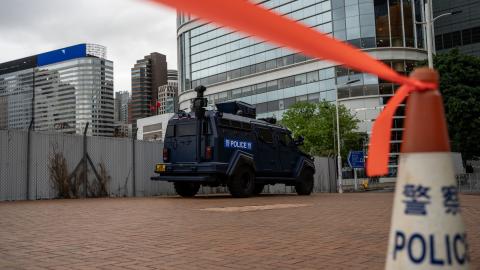Introduction
Freedom took another hit in Hong Kong as the Chinese Communist Party (CCP) and Hong Kong government used authorities under Article 23 of Hong Kong’s mini constitution, known as the Basic Law, to implement what is essentially a new national security law—an NSL 2.0. Hong Kong Chief Executive John Lee ordered the city-state’s Legislative Council to consider Article 23 legislation expeditiously. In a month, the law was passed. NSL 2.0 is a death knell for civil and political liberties and will no doubt lead to further repression in Hong Kong.
The 2020 national security law, the first NSL, was bad enough, criminalizing anything the CCP deems secession, subversion, terrorism, or collusion with foreign forces. This crackdown led to a precipitous decline in freedom for Hong Kongers. According to the Hong Kong Democracy Council, there are now nearly 2,000 political prisoners in the city-state. This includes well-known names like Apple Daily founder Jimmy Lai, pro-democracy leader Joshua Wong, and reporter and former political candidate Gwyneth Ho. Hong Kong—once the world’s most vibrant and free economy—is now locking up its best and brightest.
The Hong Kong government hasn’t stopped there. It has shuttered news outlets like Apple Daily and Stand News, used its once free and fair judiciary to target its own citizens for committing political crimes, and even extraterritorially targeted pro-democracy activists with bounties in the United States, the United Kingdom, and Australia. Since the NSL’s implementation, Hong Kong is hardly recognizable.
The NSL 2.0 goes even further. When implemented, the bill will strengthen the CCP’s hand in shutting down opposition. It uses a broad definition of national security to tamp down on what it defines as espionage and theft of state secrets, sabotage activities, treason, insurrection and sedition, and collusion with external forces, among other crimes. According to Hong Kong Free Press, the aforementioned are by and large new crimes that add to the political crimes outlined in the original NSL. Punishment for these offenses can include decades in prison, and several crimes involving “external forces” are subject to life imprisonment. NSL 2.0 will certainly have a chilling effect on what remains of Hong Kong’s freedoms.
The Hong Kong government has justified its actions, claiming that its use of Article 23 authorities is for the purpose of restoring order to the city-state. But in reality, the CCP is continuing its rapid transformation of Hong Kong from a free territory to a bound one.
Washington is at a crossroads. It now has an opportunity to prove America’s commitment to promoting a free and open Indo-Pacific. In particular, the Biden administration could demonstrate that the preservation of democratic norms is truly at the center of its foreign policy.
The NSL 2.0 merits a strong response, one that holds perpetrators accountable and strengthens the Hong Kong people’s ability to safeguard their freedom against the CCP’s escalating repression. The US government should issue sanctions against any individuals or entities responsible for carrying out and implementing NSL 2.0, pursue closure of the Hong Kong Economic and Trade Offices, and extend Hong Kong refugees’ safe haven. Washington should also look for ways to strengthen overarching US policy toward Hong Kong—making full use of preexisting authorities under the Hong Kong Human Rights and Democracy Act and the Hong Kong Autonomy Act—and explore what tools it has at its disposal to shift the risk calculus of the CCP and Hong Kong authorities against further repression.
The Consequences of Inaction
The United States seeks to promote a free and open Indo-Pacific, and within that strategy is an inherent commitment to protect and preserve values. Few actions more clearly threaten freedom and openness than the CCP’s systematic and continued dismantlement of freedom in Hong Kong. A weak response emboldens Beijing to continue to undermine freedom in Hong Kong and elsewhere. A policy that stands on the side of liberty and supports oppressed people when a government fails to protect their rights and liberties would help maintain the balance of power in Asia. Acting in concert with allies like Japan, South Korea, and Australia—to condemn the CCP’s actions and side with the people of Hong Kong would send a strong message to Beijing that the world is watching and warn that its repressive actions will have significant consequences.
The CCP and the Hong Kong authorities’ latest move merits a strong response if for no other reason than that the Hong Kong people need US and international support. After the Hong Kong government conducted a one-month comment period, it claimed that Article 23 legislation enjoyed 98.6 percent support—a North Korea–like acquiescence to a government’s agenda. The reality is that Hong Kongers no longer possess the ability to object as they had done in the past. In 2003, Hong Kong authorities tried to consider legislation under Article 23, but Hong Kongers protested with over 500,000 people marching on the streets. But today authorities have either jailed the opposition or coerced the Hong Kong people into self-censoring. While US support did not defeat the 2024 legislation, Washington could help express the will of the Hong Kong people by proxy. Critically, the US can lay the groundwork to hold Hong Kong authorities to account even when the Hong Kong people cannot.
A failure to respond—to hamstring the CCP and the Hong Kong government’s ability to undermine Hong Kongers’ freedom—will have significant implications for the groups most affected by the new law’s passage. This includes political prisoners and citizens facing trumped-up political charges like Jimmy Lai, the Hong Kong 47, and others. The law also increases the risk that the Hong Kong government will make additional arrests and that the list of political prisoners will continue to grow.
The Hong Kong government’s targeting doesn’t stop at its own borders; the issuance of bounties for activists living outside of Hong Kong may also increase post–NSL 2.0. For the sake of these and other vulnerable communities, the US government and the international community should undertake strong action.
Recommendations
The US response to the Hong Kong government’s crackdown on peaceful, pro-democracy protests and the institution of the NSL in 2020 was swift. NSL 2.0 merits an equally swift but even more decisive response—one that recognizes Hong Kong’s permanent shift from an autonomous, rights-respecting state to an extension of the CCP.
While the US government has many tools at its disposal, its response to Article 23 legislation should be exacting—a direct response to the types of action the Hong Kong government and CCP are undertaking right now. Congress and the executive branch should:
• Issue targeted sanctions against individuals and entities responsible for implementing, enforcing, prosecuting, and ruling on the 2020 NSL and the NSL 2.0. The US government can use preexisting sanctions authorities under the Hong Kong Human Rights and Democracy Act, the Hong Kong Autonomy Act, and the Global Magnitsky Act, among others. Current legislation, the Hong Kong Judicial Sanctions Act, puts forth a list of nearly 50 Hong Kong judges and prosecutors ripe for sanctioning. The Congressional-Executive Commission on China has also put forth a list of names of individuals in Hong Kong to be sanctioned and is actively calling for sanctions in response to NSL 2.0. Individuals responsible for undermining freedom in Hong Kong should face consequences for their actions—especially those responsible for the law’s creation and implementation.
• Revoke special privileges and immunities conferred to Hong Kong Economic and Trade Offices (HKETOs) and any other Hong Kong government–affiliated bodies operating in the US. At present, HKETOs in cities across the US enjoy special treatment akin to diplomatic privileges and immunities. After the US determined that Hong Kong is no longer sufficiently autonomous to merit separate treatment under US law, policymakers should have revoked these privileges and immunities. The passage of NSL 2.0 makes the distinction between Beijing and Hong Kong meaningless, so Hong Kong should no longer receive separate diplomatic recognition from the People’s Republic of China. Current legislation, the Hong Kong Economic and Trade Office Certification Act, proposes a process whereby the US government would have to determine whether HKETOs continue to merit special treatment. A move to revoke special privileges would diminish the offices’ influence and rightly recognize the role they play in currying favor for Beijing.
• Extend permanent safe haven to Hong Kongers who need refuge in the US. The executive branch has the authority to designate Hong Kongers as a group that merits “special humanitarian concern,” extending them permanent safe haven under the Priority 2 Refugee Program (P-2). Individuals eligible for P-2 refugee status can bypass referral from nongovernmental organizations, embassies, and the United Nations High Commissioner for Refugees (UNHCR). P-2 refugees are instead vetted directly by the US government in a thorough but expedited manner. Given the permanent state of affairs in Hong Kong, the Biden administration should consider extending a permanent avenue for resettlement.
These three recommendations are particularly salient because they are a punishment that fits the crime. Sanctioning those responsible for undermining freedom in Hong Kong directly holds perpetrators accountable. Stripping HKETOs of their special privileges and immunities recognizes what is already explicitly stated in US policy: that Hong Kong is no longer sufficiently autonomous to merit separate treatment from the PRC under US law. Finally, extending safe haven to refugees through the P-2 program is the most practical and permanent way to assist Hong Kongers in their time of need.
Both Congress and the executive branch possess the authority to act on each of these fronts. To stand on the side of freedom, to support the Hong Kong people, and to hold the CCP and Hong Kong government accountable, the US government should act decisively now.




















